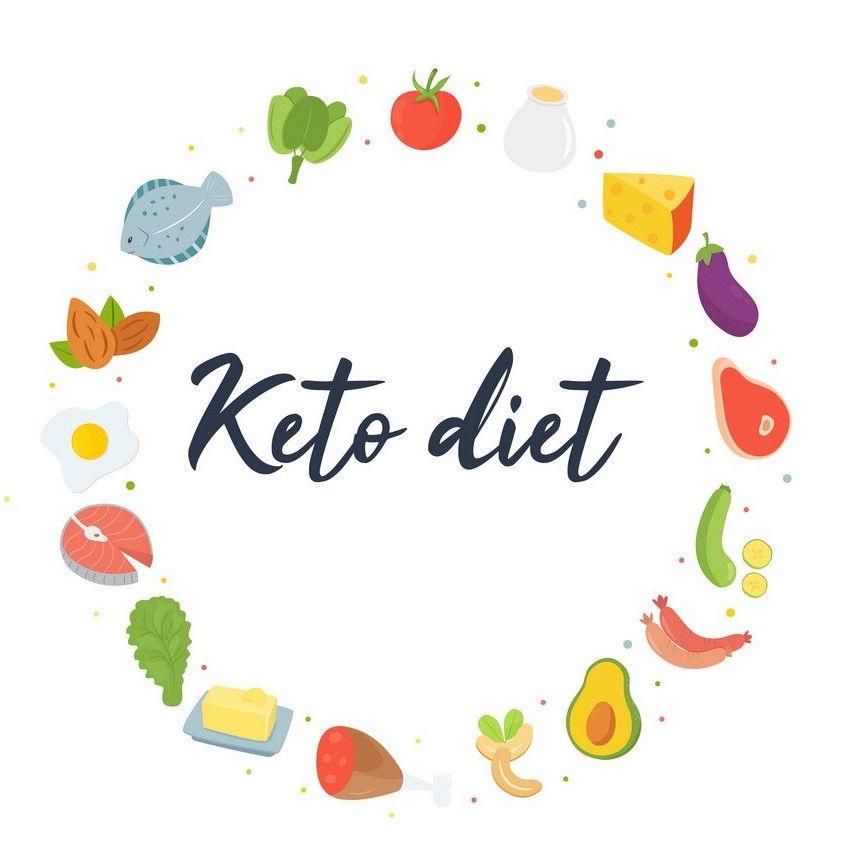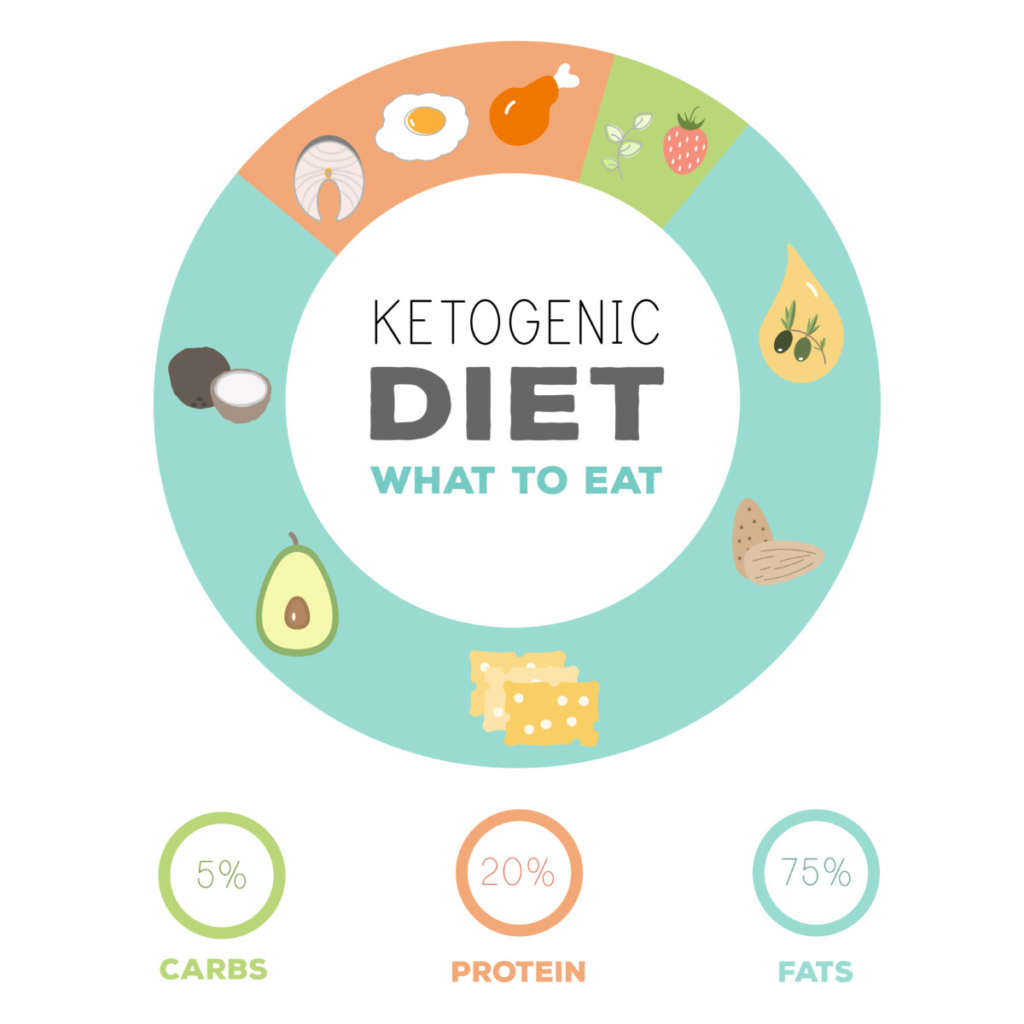THE KETO DIET

In today’s blog I’d like to discuss the ketogenic diet (otherwise known as the “keto” diet), which has experienced a staggering rise in popularity in recent times and growing attention amongst food industry experts. In simple terms, the diet can be described as a very low carb, high fat diet that offers numerous health benefits including weight loss and an overall improvement in health.
The diet works by causing fat to break down by creating substances known as ketones, through a process called ketosis. Ketosis occurs when the body does not have enough glucose for energy and starts to burn stored fats instead.
The keto diet has been used for decades as a treatment for epilepsy, Alzheimer’s disease, cancer, acne and polycystic ovary disease (PCOS). Nowadays, people are starting to recognize its remarkable effects on weight loss. The diet simply involves reducing carbs and increasing fat. While this may be contrary to common sense, the benefits of the diet arise from allowing the body to burn fat as a fuel instead of carbs. Moreover, it enables the consumption of fewer calories without making you feel hungry. For these reasons, the keto diet is emerging as the one to follow for accelerated weight loss.
Keto the Healthy Way
A healthy approach to the keto diet is strongly encouraged by consuming healthy fats such as avocado, olive oil, oily fish, coconuts and seeds. These fats are usually called mono-unsaturated fatty acids and can be found in plant oils. Polyunsaturated fatty acids are also promoted as part of this diet, since they are considered healthy and cardio-protective. They can be found in fatty fish as well as nuts and seed oils. Unlike these healthy fats, saturated fatty acids that are primarily found in animal food sources are discouraged, since they are considered a potential risk for cardiovascular disease when consumed in excess.
Anyone relying on the keto diet for weight loss must remember that this is a high fat diet, ideally with 75% of calories derived from fat, 20% derived from proteins and 5% derived from carbohydrates. In the short term, the keto diet is very efficient for weight loss when it is followed strictly for at least 4 weeks. Foods to Eat on a Keto Diet
Foods to Eat on a Keto Diet
✅ Healthy fats and oils - Butter, lard, coconut oil, olive oil, and high-fat dressings
✅ Dairy - Full-fat cheeses, sour cream, and heavy cream
✅ Protein - Eggs, beef, pork, chicken and seafood
✅ Vegetables - Dark leafy greens like spinach and other above-ground vegetables
✅ Fruits - Lower-carb fruits like blackberries, raspberries, and strawberries
✅ Nuts and seeds - Macadamia nuts, pecans, and almond butter are excellent high-fat options
Foods to Avoid on a Keto Diet
❌ Soda and Juice - Beware of high sugar drinks like fruit juice and smoothies
❌ Grains and starches – Stay away from all wheat-based products, pasta, rice and cereal
❌ Bread – Whether brown or white, bread is high in carbohydrates and must be avoided
❌ Sugary Snacks – Candy, chocolate bars, cake and ice cream contain an excess quantity of sugar
❌ Fruit - All fruit, except small portions of berries like strawberries
❌ Beans or legumes - Peas, kidney beans, lentils, chickpeas
❌ Root vegetables - Potatoes, sweet potatoes, carrots, parsnips
❌ Low-fat or sugar-free diet products - These are highly processed and often high in carbs
❌ Some condiments or sauces - These often contain sugar and unhealthy fat
❌ Alcohol - Due to their carb content, many alcoholic beverages can throw you out of ketosis
Click here for a sample of delicious, keto-friendly meals you can enjoy over a 7-day period. The options are simple to make and offer plenty of variety to ensure you're never bored or unsatiated during your keto journey.
Notable Health Benefits
As mentioned, the ketogenic diet could also have a positive effect on serious health conditions such as cardiovascular disease and diabetes. Furthermore, it may improve levels of HDL cholesterol (high-density lipoproteins, also known as "good" cholesterol) more effectively than other moderate carbohydrate diets. These health benefits can be attributed to the loss of excess weight and consumption of healthier foods, rather than a reduction in carbohydrates. Other notable advantages of the keto diet include reduced appetite, fat loss from the abdominal cavity, reduced blood sugar and insulin levels (more on this below), lower blood pressure, improvement in cognitive function, reduced gut inflammation, better sleep quality and improved productivity.
Ketosis and Type 2 Diabetes
In diabetic patients, ketosis can occur due to the body not having enough insulin to process the glucose in the body. Some dietitians recommend a ketogenic diet for individuals with type 2 diabetes, also known as non-insulin dependent diabetes. With type 2 diabetes, the body still produces some insulin but is unable to properly use it to transport glucose into cells for use as fuel. Individuals with type 2 diabetes are recommended to reduce carbohydrate intake, since carbs are converted to glucose and increase blood sugar levels. Since the ketogenic diet focuses on the reduction of dietary carb intake, it may be the ideal diet for individuals suffering from this condition.
Ketoacidosis and Type 1 Diabetes
While there are many health benefits to the keto diet as noted here, it also carries certain serious risks including ketoacidosis for people suffering from type 1 diabetes, and may result in a diabetic coma and in the most extreme cases, death. When the body produces extremely high levels of blood acids known as ketones, diabetic ketoacidosis can occur, which is a serious complication of diabetes. It results from the body’s inability to produce sufficient levels of insulin. Insulin plays an important role in facilitating sugar (glucose) to enter your cells. Since glucose is a major source of energy for your muscles and other tissues, without enough insulin your body begins to break down fat as fuel. This results in a buildup of acids in the bloodstream called ketones, which eventually leads to diabetic ketoacidosis if left untreated.
Keto Diet in the UAE
As a resident of the UAE, it is hard to ignore the prevalence of diabetes and obesity in the country. Figures from the International Diabetes Federation (IDF) reported that in 2017, an overwhelming 17.3% of the UAE population between the ages of 20 and 79 suffer from type 2 diabetes; this translates to well over 1 million people living with diabetes in the UAE. While these statistics raise serious alarm bells concerning the health of the country, the adoption of healthy dietary habits and regular exercise is becoming increasingly widespread and encouraged amongst its population. Popular food outlets across Dubai and the rest of the UAE such as Kcal, Under 500, Krave, and Fit Food Kitchen are offering much healthier alternatives to the traditional take-out. And with some of these outlets making nutritional information available beside each food item on their menus (including a breakdown of calories, fats, carbs and proteins), in addition to the rise in companies offering a range of customized meal plans for busy individuals, it is becoming easier than ever to follow a keto-friendly diet in the UAE.



